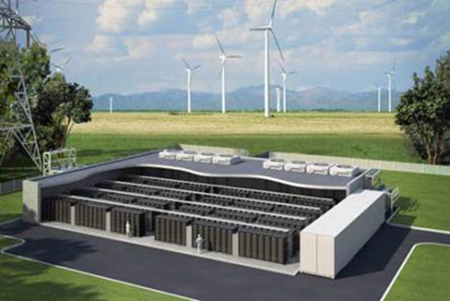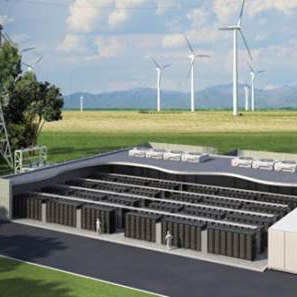Grid-scale electrochemical energy storage facility charging up on unused electricity from a windfarm, to be released to the grid during peak demand
The University of Liverpool has been awarded £3.3 million by the Engineering and Physical Sciences Research Council (EPSRC) to establish state-of-the-art facilities to support the development of advanced electrochemical energy storage devices for grid scale applications.
The funding – awarded jointly to the Universities of Liverpool and Manchester – will help as part of the Government’s strategy to invest in key technologies.
Universities and Science Minister, David Willetts, announced the funding award which has been provided to universities following the Chancellor’s announcement of additional capital funding for the ‘eight great technologies’ in his pre-budget statement.
The Liverpool-Manchester consortium has been funded to create an interdisciplinary centre of energy storage research that will allow the transformation of batteries and supercapacitors into a viable option for wide-scale adoption in utility and grid applications.
Dr Laurence Hardwick, from the University’s Department of Chemistry, said: “We are delighted to be awarded these funds from the Engineering and Physical Sciences Research Council. In partnership with the University of Manchester, it will support world-leading research facilities to work on energy storage and advanced materials. ”
“The development of national scale electricity storage promises massive benefits – in terms of savings on UK energy spend and in environmental benefits as it enables greater penetration of renewable generation technologies.”
Professor Ian Cotton, from the University of Manchester, said: “The University of Manchester is already home to the largest high voltage laboratory in the UK and a new grid-scale energy storage test facility will be made available to industrial partners to allow energy storage systems to be fully tested before widespread deployment.
David Willetts said: “For Britain to get ahead in the global race we have to back emerging technologies and ensure our universities have the latest equipment. This capital investment will help scientists make new discoveries and take their research through to commercial success. It will drive growth and support the Government’s industrial strategy.”
The Liverpool facilities will be situated within the soon to be opened Stephenson Institute for Renewable Energy new research laboratories of which Dr. Hardwick is a member.

